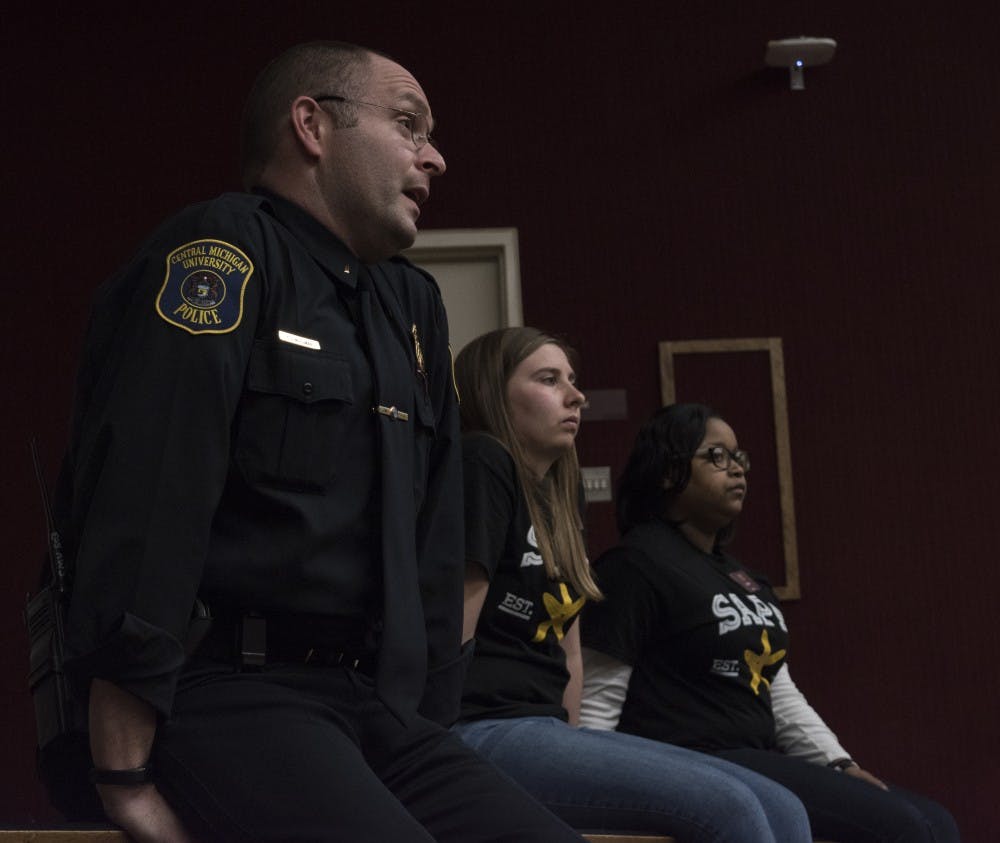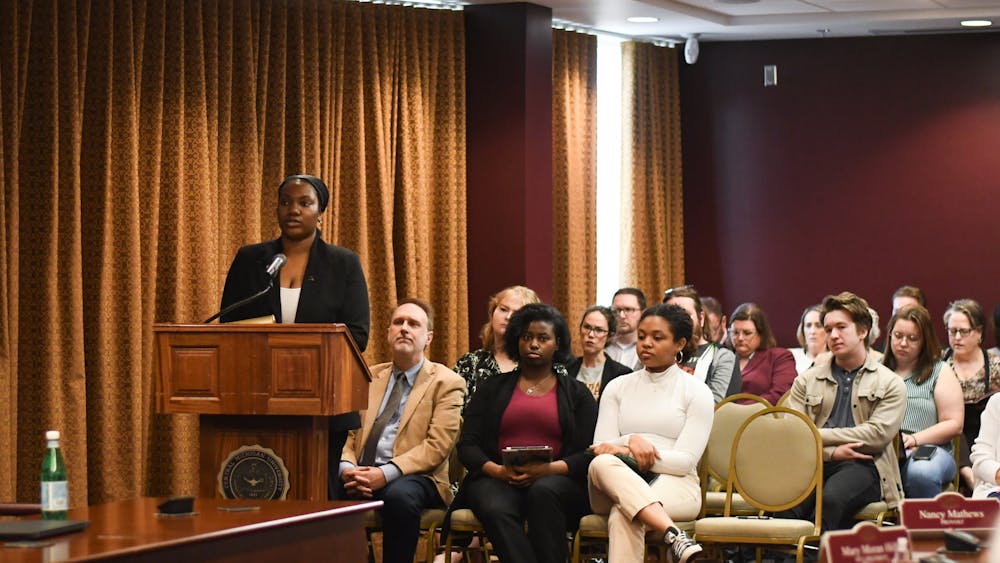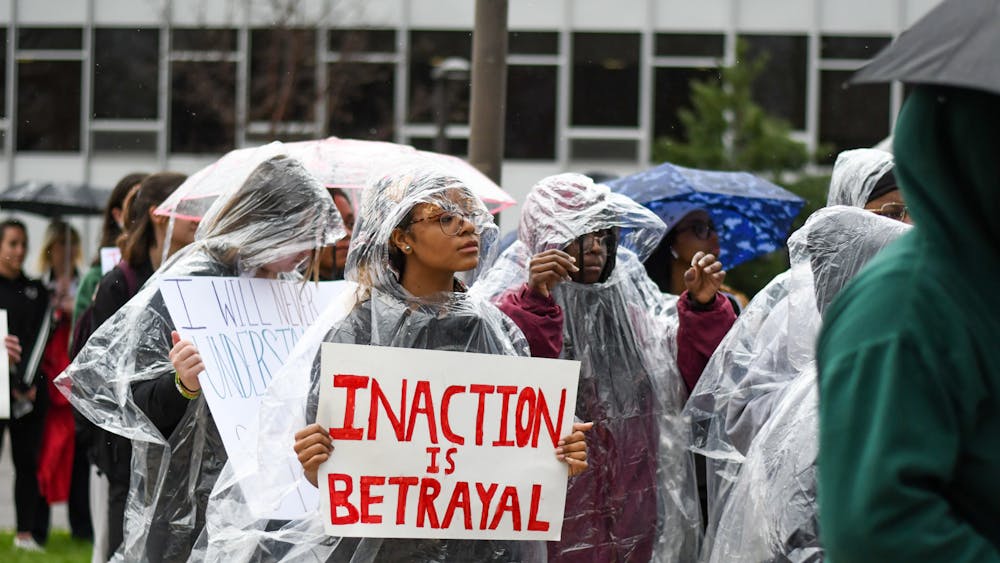Panel discusses resources on campus for sexual assault, recent school shootings

CMUPD Lt. Cameron Wassman (right) and SAPA members (center) Danielle Piggott and (left) Mikah Walker answer questions at a community forum on Feb. 26 in Room 161 in Anspach Hall.
University protocols regarding school shootings and sexual misconduct were among the topics discussed by a panel of representatives from Sexual Aggression Peer Advocates (SAPA) and the Central Michigan University Police Department Feb. 26 in Anspach Hall.
Fowler junior Danielle Piggott and Flint sophomore Mikah Walker spoke at the "Culture Control" as representatives of SAPA. Lt. Cameron Wassman spoke on behalf of CMUPD.
The event was intended to shed light and begin a conversation on issues such as shootings and recent reports and allegations of sexual assault nationally. It was hosted in collaboration of Sigma Gamma Rho Sorority, Inc. and Kappa Alpha Psi Fraternity, Inc.
Monica Hill, president of Sigma Gamma Rho Sorority, Inc. and Dan Campbell of Kappa Alpha Psi Fraternity, Inc. moderated the panel.
Hill was inspired to host the event due to the recent discussion of these topics in the news and thought it was important to have SAPA and CMUPD there to answer specific questions.
"Something like this (event) needs to happen every year, if not every semester, because this stuff happens all the time," she said. "Just a way for students to come together and talk about and make change is very important and very needed in the community."
The event commenced by showing the "Google- Year in Search 2017" video. This featured soundbites from the #MeToo Movement and the Las Vegas shooting.
"What are some things we can do for people who have been victims of sexual assault, police brutality (and) racism?" Hill asked the panelists, starting the conversation.
The discussion was open between both panelists and audience members, as people in the crowd continually raised their hands and asked questions.
Piggott said when it comes to someone who is a victim of sexual assault, those around that person need to believe them and "validate" it.
In the case of someone expressing they had been sexually assaulted to someone, Piggott said that person shouldn't undermine it and be there for the victim.
Wassman said if a victim is comfortable reporting an incident, they should report it to the police.
"We want to investigate, we want to catch the people responsible for committing these crimes," he said. "That's part of what we're here for. Outside of the criminal investigation there's also other avenues that the university has to offer through the Office of Civil Rights and Institutional Equity (and) the Title IX office, to investigate things from that angle as well."
If someone is hesitant in reporting the incident, Piggott said there are services on campus for people to listen to survivors, SAPA included. She said these services direct people to the right resources they need and help them get through the situation.
The topic of police brutality was discussed, which Wassman gave his take on by saying anyone who experiences mistreatment from officers needs to report it to that agency.
"I want to know if my officers are performing properly and I want to know if they're doing their job appropriately," he said. "I can't know whats going on unless people come back with that information."
Detroit junior Romello Ross attended the panel because he has friends in the fraternity hosting the event. He said it is important for students to be informed on the pertinent issues that were discussed.
"Everybody doesn't necessarily look into (this) type of stuff, as far as college students because we're so caught up in a lot of personal stuff," he said. "Some of us have jobs, class, exams, spring break plans, so for us to take a minute to hear something in going on in the world is kind of influential to us."
With the recent school shooting in Parkland, Fl., audience members were interested in learning about CMUPD's protocol in the event of an active shooter.
"We always take a very close look at what we do, how we train, how we respond, the equipment we have (and) the staffing we have, but we're always looking at those sort of things," he said. "Columbine that was in 1998 -- we look at those types of school shootings and how we as law enforcement have evolved since then where we are today and (have) changed considerably in terms of what our response is going to be."
Wassman said there are guidelines on CMUPD's website about the protocal students should take if there was ever an active shooter.
He added that some time after spring break, CMUPD will be releasing a video campus-wide going over the procedures in a shooting event.





